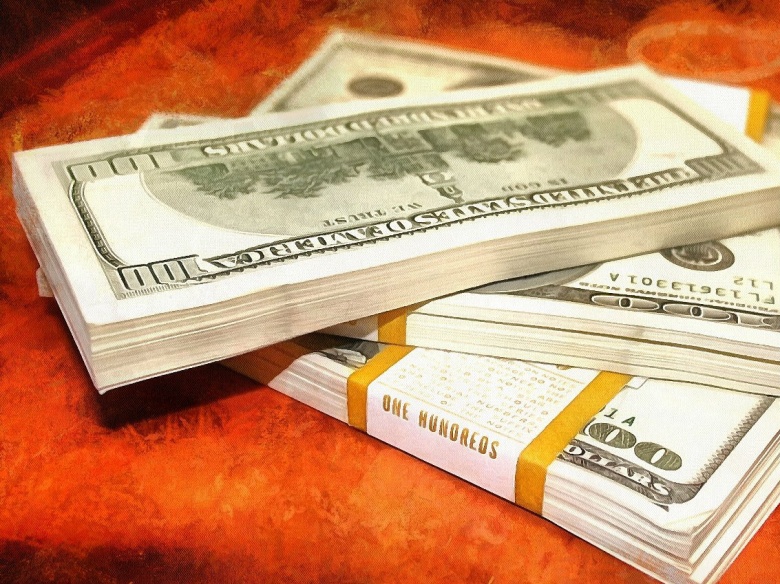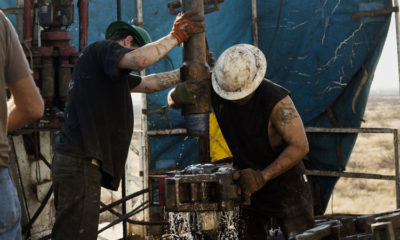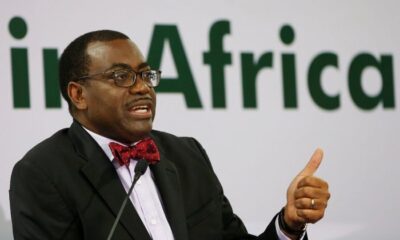Economy
Kale: Nigeria Will Exit Recession Next Year
Published
8 years agoon

- Kale: Nigeria Will Exit Recession Next Year
Barring further economic upheavals or exogenous shocks, the Nigerian economy is expected to exit the recession in 2018, the Statistician General of the Federation, Dr. Yemi Kale has said.
His forecast on the economy is more conservative than that of other watchers of the economy, including the Central Bank of Nigeria (CBN) Governor, Mr. Godwin Emefiele, Special Adviser to the President on Economic Matter, Dr. Yemi Dipeolu, the International Monetary Fund and World Bank, which have forecast that the Nigerian economy will exit the recession this year.
In an interview with Economic Confidential in Abuja, Dr. Kale said that “if oil prices do not collapse and the Niger Delta remains stable, by 2018 we would recover”.
On the performance of the Nigerian economy in the past one year, he added: “It was an extremely difficult period and we all felt it. But I will say that most of the indicators suggest that we are coming out of it.
“We have not come out of it yet, but the worst has already happened and it’s a slow process of recovery. There is also what we call technical recovery, different from the recovery Nigerians would prefer.
“When you tell somebody the economy is coming out of recession, they would say what do you mean. After all prices are still high. Coming out of a recession means recording positive growth. And your positive growth can be plus zero point one per cent (+0.1).
“But that does not mean everything is fine. It technically means you are no longer in negative territory.”
He further posited that the fact that the economy is no longer contracting does not translate to buoyancy, stressing that there is going to be a gradual process of recovery as the economy improves.
“At least all the indicators are suggesting that things are getting better. Also, people always make this mistake when we say inflation is slowing down.
“Inflationary slowdown does not mean prices are coming down. Inflation by definition is always a rise in price. All we are saying is that the increase is decelerating.
“Before it rose by 100 per cent, but this time it went up by 50 per cent. As such, having double-digit inflation figure is still a huge problem. The fact that it went down from over 18 per cent to 17 per cent and now to 16 per cent shows improvement. But I can tell you 16 per cent is not good,” he said.
According to him, if the current macroeconomic trends continue, by the end of the year things should have normalised and by 2018 Nigerians would feel the recovery.
“If oil prices do not collapse and the Niger Delta issue is managed, by 2018 we should experience full recovery,” he said.
He also acknowledged that 2016 was extremely difficult for the country but the economy had started slowing down as far back as 2014.
“I have to speak frankly as I have always done in the past, the economy has been slowing down since 2014. Anyone that was following the numbers should know that the economy was slowing down.
“From 6 per cent, GDP growth fell to 5 per cent, then to 4 per cent, then to 3 per cent, then 2 per cent, before it became negative.
“The fact that the economy was slowing down did not mean it went from six to zero, it was gradual. If you were paying attention to the data, you would have known that the problem was looming.
“Since it was an election year, people did not pay rapt attention to the slowdown. And so 2016 was horrible, because we went through hell. We had an economy, in my opinion, that was dysfunctional,” he said.
Kale likened the Nigerian economy between 2014 and 2016 to a house built on three foundations, saying that the foundations were shaky and weak.
“You have the oil sector which is one pillar, then there is the non-oil sector that is dependent on oil, which is the second pillar, and we have the non-oil sector that is not dependent on oil, like agriculture, which is the third pillar.
“Two pillars were directly dependent on oil. So when oil collapsed, two legs were impaired leaving us with one pillar. And that is the problem we had.
“Rather than diversify the economy, we had an economy solely dependent on oil. The other sectors depended on oil to survive. We have, for instance, manufacturing, but their production input is dependent on foreign materials.
“And the foreign input is dependent on foreign reserves, while our foreign reserves depend on oil earnings. So when the oil price goes down, and we do not have enough reserves, manufacturers do not get foreign exchange to get their inputs, they cannot produce and so resort to the black market to source for foreign exchange at high prices and the cost of production goes up.
“This cost will eventually be passed to consumers. In this scenario, demand goes down while cost goes up,” he explained.
Speaking on whether the economy can be rebased in a recession, Kale said the economy is supposed to rebased every five years.
“We are supposed to have to done it this year, but no allocation was made in the budget for that.
“Every country does its rebasing in a maximum of five years. The United States of America does it once a year. Those ones (countries) have more money, so they do it every year; other than the fact that their economy is more dynamic.
“Technology is changing so many things, so they have to upgrade all the time. If you don’t rebase your economy, it is like using the Betamax VCR system.
“When we rebased the economy, politicians grabbed at it because it favored them. If it were negative, nobody will even talk about it.
“I was surprised to see during the election period that APC went to our website to retrieve all the positive figures but refused to accept the ones that were negative.
“PDP too took all the positives and refused the poverty rate figures. Meanwhile, all of them are NBS data. I have even seen a minister who agreed with chapter two in one report and said chapter three was not correct.
“While commending us for a job well done in chapter two, chapter three was tagged as incorrect in the same document,” he said.
More Banks to Raise Debt
In related development, following the successful outing of two of the country’s Tier 1 banks – Zenith Bank Plc and United Bank for Africa (UBA) Plc – in raising dollar-denominated debt recently, more Nigerian banks have indicated their readiness to raise debt ahead of the Basel III regulation.
The CBN is expected to introduce the Basel III regulation in 2019, effectively requiring banks to hold more capital.
The CBN last year announced the delay in implementing the regulation following the country’s slide into recession.
In addition, analysts explained that the allure of the debt market would also be driven by international regulators requiring Nigerian lenders with foreign subsidiaries to beef up their capital.
Speaking in an interview, the chief executive of FMDQ OTC, Mr. Bola “Koko” Onadele said more banks would be expected to raise additional debt capital so as to meet the upcoming regulation.
“Basel III is on the way, maybe in the next two years. Its implementation would put some obligations on the liquidity of the banks,” the FMDQ boss added.
Rand Merchant Bank Nigeria, as part of its debt-issuance programme, last week issued N80 billion commercial papers.
The Ecobank Group plans to sell a $400 million five-year convertible bond this month to refinance debt and provide short-term funding for Ecobank Nigeria, while Fidelity Bank Plc will decide in the third quarter whether to refinance $300 million of bonds due in May next year or issue new debt.
But Onadele said some banks might have decided to have “a multi-currency programme and can decide to issue in local currency”.
Also, the chief executive of Financial Derivatives Company Limited, Mr. Bismark Rewane, pointed to another factor that would compel more banks to issue dollar-denominated debt, explaining that Nigerian lenders have foreign currency obligations which would be maturing soon.
“Now that the currency has appreciated, they want to raise the international capital needed. Those in the United States and UK are being asked by their regulators to raise additional capital.
“So, it is in compliance with their host countries’ requirements. Now that the conditions are right, they are trying to raise additional capital and then they will come back home later to raise additional funds when the stock market is stable,” Rewane explained.
But he pointed out that if the country gets out of recession this year and starts achieving positive growth of around one or two per cent next year, then the rate of default by Nigerian banks and level of impairments would begin to reduce.
He also said that if stock prices continue to rise, the environment would be right to raise additional capital.
“Capital raising is a cushion against shocks. If you are raising capital now, it would give you the tailwind to ride through the next boom and prepare you for the next shock,” he added.
To an analyst at Vetiva Capital Management Limited, Lekan Olabode, more lenders will issue Eurobonds because they need dollars to offer loans in foreign currency or to repay debt.
Union Bank Plc plans to raise N50 billion through a rights issue scheduled to take place by the end of this quarter.
Also, Sterling Bank Plc is waiting for market conditions to improve before another issuance, according to its chief financial officer, Abubakar Suleiman.
Is the CEO and Founder of Investors King Limited. He is a seasoned foreign exchange research analyst and a published author on Yahoo Finance, Business Insider, Nasdaq, Entrepreneur.com, Investorplace, and other prominent platforms. With over two decades of experience in global financial markets, Olukoya is well-recognized in the industry.

You may like
-
Nigeria Joins BRICS as Partner Country, Strengthening Global South Cooperation
-
70 Million Poorest of The Poor Nigerians To Get N75,000 From FG
-
Nigeria Surpasses OPEC Quota with 1.51 Million bpd, Targets 2.06 Million in 2025
-
Global Investors Commit $7.6 Billion to Nigeria’s Development at AIF 2024
-
Nigeria-China Trade Strengthened as Grimaldi Introduces Direct Shipping Line
-
Nigeria’s GDP Records 3.46% Growth in Q3 Spurred by Non-Oil Sector













